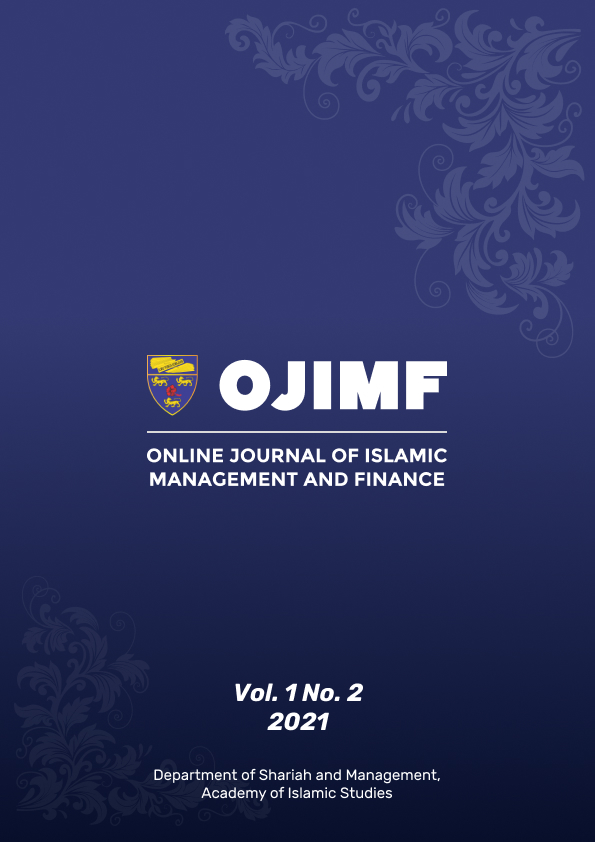إدارة الجودة: دراسة في المفاهيم والدلالات من منظور إسلامي
QUALITY MANAGEMENT: A STUDY OF CONCEPTS AND SEMANTICS FROM ISLAMIC PERSPECTIVE
DOI:
https://doi.org/10.22452/ojimf.vol1no2.1Keywords:
management, quality, concepts, semantics, Islamic perspectiveAbstract
There are many quality models around the world, and all of them originated and developed according to the western perspective of management, which seems to be a major challenge facing management in Islamic thought. This is what made the research seeks to address the problem of setting a conception of the Islamic concept of quality management. Therefore, this paper aimed to establish the concept of quality and semantics at the institutional level in line with the Islamic perspective. The paper relied on descriptive and content analysis approaches to access the extrapolation and analysis of the jurisprudential literature in order to build a perception of quality from the Islamic perspective. This paper concluded that there is a clear difference between traditional management and Islamic management, this difference made the adoption of traditional quality models become a great challenge for Islamic institutions. The philosophy of work in Islam goes beyond the goal in achieving customer satisfaction, to strive to obtain the satisfaction of Allah through, His worship and following ihsān in the work. Accordingly, the researchers recommended the necessity of building the Islamic quality model that is consistent with the Islamic model of management.
Downloads
References
Abū Ḥammād, Z., Al- Shuʿailī, S., & Al-Būsuʿaidī, S. (2017). Ḍamān al-Jawdah al- Shāmilah fi al-Qurʾān al-Karīm wa Sunnah al-Nabawiyyah: Dirāsah Mawḍuʿiyyah Taḥliliyyah. Kulliyyah al-Dirāsah al-Islāmiyyah wa al-ʿArabiyyah li al-Banāt, 7, 3121-3166.
Afrin et al, (2019). A New Model Of Continuous Improvement In Total Quality Management From An Islamic Perspective. Asian Academy of Management Journal, 24(1), 129–149.
Al Faruqi, I. R. (1992). Al-Tawhid: Its Implications for Thought and Life. Herndon. Virginia: International Institute of Islamic Thought.
Al-ʿAjalūnī, I. T. (2006). Idārah al-Jawdah fi al-Islām. Paper Presented at Al-Muʿtamar al-‘Arabī al-ʾAwwal Ḥawla Jawdah al-Jāmiʿāt wa Mutaṭallibāt al-Tarkhīṣ wa al-Iʿtimād, Al-Shāriqah, Dawlah al-Emārāt al-ʿArabiyyah.
Al-Albānī, M. N. A. (n.d). Ṣaḥīḥ al-Sīrah al-Nabawiyyah. ʿAmmān. Jordan: Al-Maktabah al-Islāmiyyah.
Al-ʿAsqalānī, I. H. A. (1419 AH). High Claims of the Supplements of the Eight Al-Sanid. Saudi Arabia: Dar al-Asimah and Dar al- Ghaith.
Al-Barʿī, M. A. & Mursī, M. A. H. (1416h). Al-Idārah fi al-Islām. Jeddah, Saudi Arabia: Maktabat al- Malik Fahd al-Waṭaniyyah wa al-Maʿhad al-Islāmī li al-Buḥūth wa li al-Tadrīb.
Al-Bukhārī, M. B. I. (1423 AH). Ṣaḥīḥ al-Bukhārī. Beirūt: Dār Ibn Kathīr.
Al-Dār-Quṭnī, A. O. (1422 AH). Sunan al-Dār-Quṭnī. Beirūt: Dār al-Maʿrifah.
Al-Fahdāwī, F. K. (2001). Al-Idārah fi al-Islām: Al-Munhajiah wa al-Taṭbīq wa al-Qawāʿid. Oman: Dār al-Masīrah.
Al-Jurjānī, E. B. M. (n..d). Al-Taʿrīfāt. Al-Qāhirah: Sharikāt Maktabāt.
Al-Muzjājī, A. (2000). Muqaddimāt fi al-Idārah al-Islāmiyyah. Jeddah: King Abdulaziz University.
Al-Qurṭubī, M. I. A. (2003). Al-Jāmiʿ li ʾAḥkām al-Qurʾān. Riyāḍ: ʿĀlam al-Kutub.
Al-Samani, N., Van K. E., & Hardjono, T. W. (2015). A Quality Management Approach from an Islamic Perspective. Paper presented at International Academy for Quality, Hungary.
Al-Ṭabarī, A. J. M. (2001). Jāmiʿ al-Bayān ʿAn Taʿwīl ʾĀy al-Qurʾān. Al-Qāhirah: Markaz al-Buḥūth wa al-Dirāsah al-ʿArabiyah wa al-Islāmiyah.
Al-Tirmidhī, A. I. M. (1395 AH). Sunan al-Tirmidhī. Al-Qāhirah: Muṣṭafā al-Bābi al-Ḥalabī.
Banī Khalaf, H. (1998). Mafhūm al-Idārah al-Islāmiyyah fi Iṭār al-Tarbiyyah al-Islāmiyyah Min Wijhah Naẓar ʾAʿḍāʾ Haiʾah al-Tadrīs fi Kuliyyah al-Tarbiah wa Mudīrī al-Madrashah al-Thanawiyyah fi Muḥafaẓāt Irbid. Master’s Thesis, Yarmouk University, Jordan.
Hassan, M.K. (2010). A Return To The Qur’ānic Paradigm Of Development An Integrated Knowledge: The Ulū al-Albāb model. Intellectual Discourse, 18(2), 183-210.
Ibn al-Athīr, M. M. (1979). Al-Nihāyah Fī Gharīb al-Ḥadīth Wa al-Athar. Beirūt: Al-Maktabah al-ʿIImiyyah.
Ibn Ḥambal, A. (n.d). Musnad Aḥmad. Beirūt: The Resala Foundation for Printing, Publishing and Distribution.
Ibn Kathīr, A. I. A. (2000). Tafsīr al-Qurʾān al-ʿAẓīm (Vol. 3). Jīzah: Muʾassasah Qurṭubah.
Ibn Taimiyyah, T. A. (1977). Al-Risālah al-Tadmuriyyah. Al-Qāhirah: Al-Matbaʿah al-Salafiyyah.
Ismail, Y., & Mhd, S. (2011). The Role Of Tawhidic Paradigm In The Transformation Of Management System. Paper presented at the National Seminar on Islamic Management Systems Transformation, PWTC, Kuala Lumpur.
Jaʿfar, M. (2014). Al-Tanẓīm al-Idārī fi al-Niẓām al-Waḍʿī wa al-Niẓām al-Islāmī. Master’s Thesis, University of Djelfa, Djelfa, Algeria.
Mat, I., & Ismail, Y. (2011). Corporate Governance: A Theoretical Analysis Of Triangular Relationships Between The Shareholders, The Board, And Chief Executive. In Ahmad, K., Islam, R. & Ismail, Y. (eds.), Issues in Islamic Management: Theories and Practices (pp. 109-120), Kuala Lumpur: IIUM Press.
Moghimi, S. M. (2018). Principles of Organizing in Islamic Management. Emerald Publishing Limited, Bingley, 145-179.
Muslim, M. I. H. (1427h). Ṣaḥīḥ Muslim. Jeddah: Dār Ṭayyibah.
Othman, K. (2017). Quality Management System vs. Maqasid Shariah Islamic Quality Management System vs. Customer Satisfaction. International Journal of Academic Research in Business and Social Sciences, 7(SI), 20-34. doi: 10.6007/IJARBSS/v7-i13/3182.
Rahman, A. (1973). Islam: Ideology And The Way Of Life. Kuala Lumpur: A.S. Noordeen.
Schumacher, E.F. (1988). Small Is Beautiful: A Study Of Economics As If People Mattered. London: Blond & Briggs.
Ṭanṭāwī, M. S. (1998). Al-Tafsīr al-Wasīṭ li al-Qurʾān al-Karīm. Al-Qāhirah: Dār Nahḍah.
ʿUmar, A. A. (2008). Muʿjam al-Lughah al-ʿArabiyyah al-Muʿāṣarah. Al-Qāhirah: ʿĀlam Al-Kutub.
Downloads
Published
How to Cite
Issue
Section
License
The published manuscript shall be a copyright of the Department of Islamic Management and Finance, Academy of Islamic Studies, Universiti Malaya, Kuala Lumpur, Malaysia. The published manuscript would not represent the stand or opinion of the Advisory Board, Editorial Board, Co-Editorial Board and the Management Team of Online Journal of Islamic Management and Finance (OJIMF), or the Department of Islamic Management and Finance, Academy of Islamic Studies, Universiti Malaya.
Note: This is an open access journal which means that all content is freely available without charge to the user or his/her institution. Users are allowed to read, download, copy, distribute, print, search, or link to the full texts of the articles in this journal without asking prior permission from the publisher or the author. This is in accordance with the BOAI definition of open access







